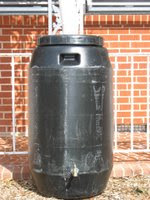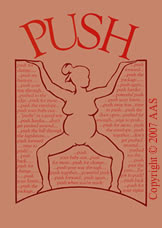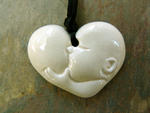My colleague, Jill Chase, PhD, has entered into the web of another blog. The discussion is on waterbirth and Jill posted info from our field of pre and perinatal birth psychology. Jill and I are both members of the Association for Pre and Perinatal Psychology and Birth and BEPE.info (Birth and Early Parenting Educators). I posted this, but I am sure that it will disappear. I enter this ring ... like All-Star wrestling very rarely, only when I see a colleague getting attacked from behind, like with a metal chair and a multi-tag team approach. So, here's my post.
Hi, Jill --
I just happened to see you were in this nasty web. Having your credentials trashed is par for the course here. Don't take it personally. All you can do is post and run at best. Any one with credentials and information to challenge the status quo, to question the big debate home vs hospital, doctor vs midwife, from the perspective of the baby gets blocked anyway.
As a developmental psychologist, maybe you can address this -- before you get blocked. It does seem logical to me that the human development never ends once the conception occurs. so, that means that whatever is happening in the womb and during the first hours and months of life -- responding, learning in response to the environment -- is also going on during labor and birth. Isn't it rather unscientific and ignorant to think that the experience of the birthing baby isn't processed like every other moment? Whatever we call it -- imprinting or memory -- the experience is recorded in the human baby's brain and body.
This blog won't ever talk about the real needs of the baby. Because obstetrics and midwifery both deny that the baby is an aware, live being, the brain is working, is "online" and recording everything, and that the neocortex and language will develop based on what has happened before, you won't find an audience here. Most people have experienced harsh, rough treatment and interventions. Some take the perspective that it's the way it is and doesn't matter because we don't remember. Ironically, they are the medically trained and entrenched people, or their zombie followers. It is like that hazing mentality. They got through it just fine, so there is no reason to stop doing it. To realize that babies remember birth opens up a whole new level of FEELING ... denial is easier. "Because we have always done it" is easier answer than saying, "OH MY GOD... what have we done and what can do it about." Most of the people here can not go there --- they can not also see the field we belong to as having resources for healing when one has been traumatized.
Suzanne:
"Hey, I bet my babies didn't particularly love being intubated or placed on respirators! I should have told the NICU staff not to bother, as I wouldn't want to cause psychological problems later on!"
This is a perfect example of how the denial belief system that says we should just ignore that babies remember when some babies need interventions. Somehow, the need to do interventions with the knowing that the baby is going to impacted for life doesn't enter into the denial locked mind. WHEN babies need touch and intervention, a simple answer/solution is to do the touch with awareness. Our field believes we should tell the baby what is happening, ask permission, and to support the mother to be supporter of the baby.
Speaking to the baby, holding and comforting the baby before interventions when possible ... in a medical emergency, someone explaining to the baby, acknowledging the pain, the fast past, the separation from the mother and creating a safe environment. But the biggie is in a fast, harsh intervention, and/or on ongoing such as in NICU, the caregiver knowing that the baby is experiencing it and the brain and body will remember, will acknowledge this, maybe not verbally in the moment, but with their touch and regard for the baby. There is a whole field of research and practices for how to help the baby afterwards. This is what the human being needs in every other stage of life...
I was banned here repeatedly for posting what you have about our field and then started Hospitalbirthdebate.blogspot.com. I have done several posts on this over the past year. Feel free to be a guest poster.
As the blogger on hospitalbirthdebate, I was featured on Tales from the Womb. The NICU doctor blasted Dr. Wirth and denied that it is scientific that baby's remember; but who can deny that they experience it? He said on his April 22 post, "So no, I will not be softly and calmly uttering phrases like 'You're dying. Stay calm. I'm going to do an emergent chest tube insertion. It'll probably hurt... a lot, because if I take time to use pain medication, that tension pneumothorax is going to kill you.' to babies in the delivery room. Sorry."
Why not? Why not give a newborn baby struggling for life the same respect we would like to see our child, friend, spouse, or parent receive in their life threatening crisis?
My main point/question to those who feel that since their baby experienced or they are a doctor who does it ... And who can deny that human development is one, long continuum from conception forward? How can you scientifically promote that human being goes into "OFF" or "blob mode" in labor or birth or just because they are in the hospital, or being touched by medically trained people.
There is a middle ground. It IS ok to acknowledge the human newborn AND deliver conscious, gentle, acknowledging care and touch. AND, more importantly, we know HOW to help these babies to not live in the shadow of harsh entry into the world.
Our field is new, cutting edge, and compiling all of the science from multiple fields. She, like most medically trained people who are treating babies as they do, refuse to look at what they are doing -- even when based in science. But then, obstetrics is known, even within medical field, to be non-science based.
I am on my way to California right now to spend a month with David and Donna Chamberlain and our BEPE.info group. I'll have some good posts on this topic this month. And, I am posting this one now.
Janel
Baby Keeper
The Other Side of the Glass
Part One was officially released June 2013 in digital distribution format.
To purchase to to www.theothersideoftheglass.com
If you were a donor and want to download your copy send an email to theothersideoftheglassfilm@gmail.com.
The trailer
Subscribe to:
Post Comments (Atom)
"Soft is the heart of a child. Do not harden it."
A public awareness reminder that things that happen behind the scenes, out of our sight, aren't always as rosy as we might think them to be. Perhaps its a restaurant cook who accidentally drops your burger
on the floor before placing it on the bun and serving it to you. Here it's an overworked apathetic (pathetic) nurse giving my newborn daughter her first bath.
Please comment and rate this video, so as to insure that it is viewed as widely as possible, perhaps to prevent other such abuse. -- The mother who posted this YouTube. How NOT to wash a baby on YouTube
Are you going to try to tell me that "babies don't remember?" There is no difference to this baby's experience and the imprinting of her nervous system/brain and one that is held and cleaned by the mother or father either at the hospital or at home?
By the way, this is probably NOT the baby's first bath. The nurse is ungloved. Medical staff protocol is that they can't handle a baby ungloved until is has been bathed (scrubbed if you've seen it) because the baby is a BIO-HAZARD -- for them. Never mind that the bio-hazard IS the baby's first line of defense against hospital germs.
Missouri Senator Louden Speaks
Finally, A Birth Film for Fathers
Part One of the "The Other Side of the Glass: Finally, A Birth Film for and about Men" was released June, 2013.
Through presentation of the current research and stories of fathers, the routine use of interventions are questioned. How we protect and support the physiological need of the human newborn attachment sequence is the foundation for creating safe birth wherever birth happens.
Based on knowing that babies are sentient beings and the experience of birth is remembered in the body, mind, and soul, fathers are asked to research for themselves what is best for their partner and baby and to prepare to protect their baby.
The film is designed for midwives, doulas, and couples, particularly fathers to work with their caregivers. Doctors and nurses in the medical environment are asked to "be kind" to the laboring, birthing baby, and newborn. They are called to be accountable for doing what science has been so clear about for decades. The mother-baby relationship is core for life. Doctors and nurses and hospital caregivers and administrators are asked to create protocols that protect the mother-baby relationship.
Men are asked to join together to address the vagaries of the medical system that harm their partner, baby and self in the process of the most defining moments of their lives. Men are asked to begin to challenge the system BEFORE they even conceive babies as there is no way to be assured of being able to protect his loved ones once they are in the medical machine, the war zone, on the conveyor belt -- some of the ways that men describe their journey into fatherhood in the medicine culture.
Donors can email theothersideoftheglassfilm@gmail.com to get a digital copy.
Through presentation of the current research and stories of fathers, the routine use of interventions are questioned. How we protect and support the physiological need of the human newborn attachment sequence is the foundation for creating safe birth wherever birth happens.
Based on knowing that babies are sentient beings and the experience of birth is remembered in the body, mind, and soul, fathers are asked to research for themselves what is best for their partner and baby and to prepare to protect their baby.
The film is designed for midwives, doulas, and couples, particularly fathers to work with their caregivers. Doctors and nurses in the medical environment are asked to "be kind" to the laboring, birthing baby, and newborn. They are called to be accountable for doing what science has been so clear about for decades. The mother-baby relationship is core for life. Doctors and nurses and hospital caregivers and administrators are asked to create protocols that protect the mother-baby relationship.
Men are asked to join together to address the vagaries of the medical system that harm their partner, baby and self in the process of the most defining moments of their lives. Men are asked to begin to challenge the system BEFORE they even conceive babies as there is no way to be assured of being able to protect his loved ones once they are in the medical machine, the war zone, on the conveyor belt -- some of the ways that men describe their journey into fatherhood in the medicine culture.
Donors can email theothersideoftheglassfilm@gmail.com to get a digital copy.
Buy the film at www.theothersideoftheglass.com.
The film focuses on the male baby, his journey from the womb to the world and reveals healing and integrating the mother, father, and baby's wounded birth experience. The film is about the restoring of our families, society, and world through birthing loved, protected, and nurtured males (and females, of course). It's about empowering males to support the females to birth humanity safely, lovingly, and consciously.
Finally, a birth film for fathers.
The film focuses on the male baby, his journey from the womb to the world and reveals healing and integrating the mother, father, and baby's wounded birth experience. The film is about the restoring of our families, society, and world through birthing loved, protected, and nurtured males (and females, of course). It's about empowering males to support the females to birth humanity safely, lovingly, and consciously.
Finally, a birth film for fathers.
What People Are Saying About the FIlm
Well, I finally had a chance to check out the trailer and .. wow! It's nice that they're acknowledging the father has more than just cursory rights (of course mom's rights are rarely acknowledged either) and it's great that they're bringing out the impact of the experience on the newborn, but I'm really impressed that they're not shying away from the political side.
They are rightly calling what happens in every American maternity unit, every day, by its rightful name - abuse. Abuse of the newborn, abuse of the parents and their rights, abuse of the supposedly sacrosanct ethical principal of patient autonomy and the medico-legal doctrine of informed consent, which has been long ago discarded in all but name. I love it!
In the immortal words of the "shrub", "bring it on!" This film needs to be shown and if I can help facilitate or promote it, let me know.
Father in Asheville, NC
Thanks for sharing this. It was very touching to me. I thought of my brother-in-law standing on the other side of the glass when my sister had to have a C-section with her first child because the doctor was missing his golf date. I'll never forget his pacing back and forth and my realizing that he was already a father, even though he hadn't been allowed to be with his son yet.
Margaret, Columbia, MO
They are rightly calling what happens in every American maternity unit, every day, by its rightful name - abuse. Abuse of the newborn, abuse of the parents and their rights, abuse of the supposedly sacrosanct ethical principal of patient autonomy and the medico-legal doctrine of informed consent, which has been long ago discarded in all but name. I love it!
In the immortal words of the "shrub", "bring it on!" This film needs to be shown and if I can help facilitate or promote it, let me know.
Father in Asheville, NC
OMG'ess, I just saw the trailer and am in tears. This is so needed. I watch over and over and over as fathers get swallowed in the fear of hospitals birth practice. I need a tool like this to help fathers see how very vital it is for them to protect their partner and baby. I am torn apart every time I see a father stand back and chew his knuckle while his wife is essentially assaulted or his baby is left to lie there screaming.
Please send me more info!!!!
Carrie Hankins
CD(DONA), CCCE, Aspiring Midwife
720-936-3609
Thanks for sharing this. It was very touching to me. I thought of my brother-in-law standing on the other side of the glass when my sister had to have a C-section with her first child because the doctor was missing his golf date. I'll never forget his pacing back and forth and my realizing that he was already a father, even though he hadn't been allowed to be with his son yet.
Margaret, Columbia, MO
In case you don't find me here
Soon, I'll be back to heavy-duty editing and it will be quiet here again. I keep thinking this blog is winding down, and then it revives. It is so important to me.
I wish I'd kept a blog of my journey with this film this past 10 months. It's been amazing.
I have a new blog address for the film, and will keep a journal of simple reporting of the journey for the rest of the film.
www.theothersideoftheglassthefilm.blogspot.com
I'll be heading east this week to meet with a group of men. I plan to post pictures and clips on the film blog.
I'll keep up here when I can -- when I learn something juicy, outrageous, or inspiring related to making birth safer for the birthing baby.
I wish I'd kept a blog of my journey with this film this past 10 months. It's been amazing.
I have a new blog address for the film, and will keep a journal of simple reporting of the journey for the rest of the film.
www.theothersideoftheglassthefilm.blogspot.com
I'll be heading east this week to meet with a group of men. I plan to post pictures and clips on the film blog.
I'll keep up here when I can -- when I learn something juicy, outrageous, or inspiring related to making birth safer for the birthing baby.
Review of the film
Most of us were born surrounded by people who had no clue about how aware and feeling we were. This trailer triggers a lot of emotions for people if they have not considered the baby's needs and were not considered as a baby. Most of us born in the US were not. The final film will include detailed and profound information about the science-based, cutting-edge therapies for healing birth trauma.
The full film will have the interviews of a wider spectrum of professionals and fathers, and will include a third birth, at home, where the caregivers do a necessary intervention, suctioning, while being conscious of the baby.
The final version will feature OBs, RNs, CNMs, LM, CPM, Doulas, childbirth educators, pre and perinatal psychologists and trauma healing therapists, physiologists, neurologists, speech therapists and lots and lots of fathers -- will hopefully be done in early 2009.
The final version will include the science needed to advocated for delayed cord clamping, and the science that shows when a baby needs to be suctioned and addresses other interventions. Experts in conscious parenting will teach how to be present with a sentient newborn in a conscious, gentle way -- especially when administering life-saving techniques.
The goal is to keep the baby in the mother's arms so that the baby gets all of his or her placental blood and to avoid unnecessary, violating, and abusive touch and interactions. When we do that, whether at home or hospital, with doctor or midwife, the birth is safe for the father. The "trick" for birthing men and women is how to make it happen in the hospital.
The full film will have the interviews of a wider spectrum of professionals and fathers, and will include a third birth, at home, where the caregivers do a necessary intervention, suctioning, while being conscious of the baby.
The final version will feature OBs, RNs, CNMs, LM, CPM, Doulas, childbirth educators, pre and perinatal psychologists and trauma healing therapists, physiologists, neurologists, speech therapists and lots and lots of fathers -- will hopefully be done in early 2009.
The final version will include the science needed to advocated for delayed cord clamping, and the science that shows when a baby needs to be suctioned and addresses other interventions. Experts in conscious parenting will teach how to be present with a sentient newborn in a conscious, gentle way -- especially when administering life-saving techniques.
The goal is to keep the baby in the mother's arms so that the baby gets all of his or her placental blood and to avoid unnecessary, violating, and abusive touch and interactions. When we do that, whether at home or hospital, with doctor or midwife, the birth is safe for the father. The "trick" for birthing men and women is how to make it happen in the hospital.






No comments:
Post a Comment